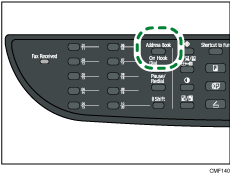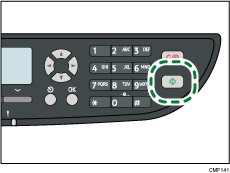Basic Operation for Scan to E-mail/FTP/Folder
This section describes the basic operation for sending scanned files via E-mail, to an FTP server, or to a computer. The scanned file is sent via E-mail, to an FTP server, or a computer, depending on the specified destination.
![]()
The original in the ARDF or ADF takes precedence over the original on the exposure glass if you place originals both in the ARDF/ADF and on the exposure glass.
When using the Scan to E-mail, Scan to FTP or Scan to Folder function, you must first register the destination in the Address Book using Web Image Monitor.
If a USB flash disk is inserted in the machine, scanning functions other than Scan to USB are not possible from the control panel. Make sure there is no USB flash disk inserted in the machine.
![]() Place the original on the exposure glass or in the ARDF/ADF.
Place the original on the exposure glass or in the ARDF/ADF.
![]() Press the [Scanner] key, and then press the [Address Book] key.
Press the [Scanner] key, and then press the [Address Book] key.

Alternatively, you can press the [Shortcut to Func.] key if [Shortcut to Function] under administrator settings is set to [Select Scanner Dest.].
![]() Press the [
Press the [![]() ][
][![]() ] keys to select [Search Address Book], and then press the [OK] key.
] keys to select [Search Address Book], and then press the [OK] key.
If you want to search for a specific entry by its name, enter the first letters of the name using the number keys, and then press the [OK] key. Each time you enter a character, the display changes to show the matching name.
![]() Search for the desired destination by pressing the [
Search for the desired destination by pressing the [![]() ][
][![]() ] keys to scroll the Address Book, and then press the [OK] key.
] keys to scroll the Address Book, and then press the [OK] key.
When you specify a scan destination, the machine's scan settings change automatically according to the information registered for that destination in the Address Book. If necessary, you can change the scan settings using the control panel.
![]() Press the [Start] key.
Press the [Start] key.

Depending on the machine's settings, you may see the following screen on the display when scanning from the exposure glass.

If you see this screen, proceed to the next step.
![]() If you have more originals to scan, place the next original on the exposure glass, and then press [Yes]. Repeat this step until all originals are scanned.
If you have more originals to scan, place the next original on the exposure glass, and then press [Yes]. Repeat this step until all originals are scanned.
![]() When all originals have been scanned, press [No] to start sending the scanned file.
When all originals have been scanned, press [No] to start sending the scanned file.
![]()
To cancel scanning, press the [Scanner] key, and then press the [Clear/Stop] key. The scan files are discarded.
You can configure the machine to scan documents in black and white, color, or grayscale by changing the [Scanning Mode] setting under scanner settings.
You can also specify a destination using the One Touch buttons, [Pause/Redial] key, or from an LDAP server.
If the [Limitless Scan] setting under scanner settings is enabled, you can place originals on the exposure glass repeatedly in a single scan procedure.
If [File Type] under scanner settings is set to [Multi-page], you can scan multiple pages to create a single PDF or TIFF file containing all pages. However, if the file format is JPEG, a single-page file will be created for every page scanned.
If paper is jammed in the ARDF or ADF, the scan job will be discarded. Remove the jammed paper and scan the entire originals again.
![]()
For details about [Shortcut to Function], see Administrator Settings
 .
.To place the original, see Placing Originals
 .
.To configure advanced scan settings, see Specifying the Scan Settings
 .
.For details about specifying the scan destination, see Specifying the scan destination using the One Touch buttons or [Pause/Redial] key
 .
.For details about specifying the scan destination from an LDAP server, see Specifying the scan destination from an LDAP server
 .
.For details about [Scanning Mode], [File Type], or [Limitless Scan], see Scanner Settings
 .
.For details about how to remove the paper jammed in the ARDF or ADF, see Removing Scanning Jams (Type 2 model)
 or Removing Scanning Jams (Type 1 model)
or Removing Scanning Jams (Type 1 model) .
.

